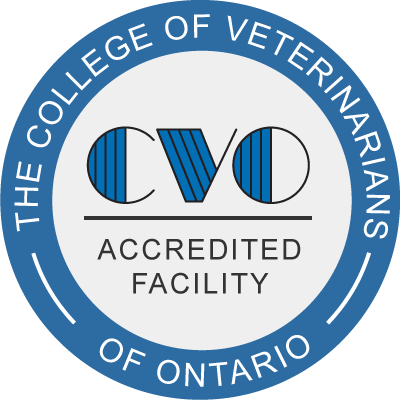The Bloor West Village Animal Hospital provides a variety of surgical services on site in a dedicated surgical suite
Neutering
Neutering refers to the surgical procedure performed on male dogs and cats to remove the testicles and therefore render them infertile. Benefits of this procedure include prevention of pet overpopulation, decreased amount of wandering by your male companion, reducing the possibility of injury by cars etc, and prevention of diseases such as prostate disease and testicular cancer.
The procedure in dogs is performed under general anesthesia and consists of incising into the skin of the abdomen just in front of the scrotum. Both testicles are removed through this incision and ligatures (knots) are used to prevent blood loss. The subcutaneous tissues and skin are sutured closed with dissolving suture material (it can take up to 6 weeks for the stitches to completely dissolve), and your dog is kept quiet for the next 5-6 days (leash walking only), to ensure the stitches remain strong. It is recommended that you watch to see if your dog licks the incision obsessively, resulting in a rash. In these cases an Elizabethan collar can be used to prevent further licking.
During the surgery your dog is kept on IV fluids to maintain blood pressure and hydration, and is monitored by anesthetic monitoring devices as well as by a member of the nursing staff. Perioperative pain management is given before, during (a local anesthetic is administered) and after the procedure.
The procedure in cats is performed under general anesthesia and consists of making incisions into the scrotum through which the testicles are removed. Ligatures (knots) are used to prevent blood loss. The incisions are not sutured in cats, because the skin of the scrotum heals so quickly (the incisions are usually healed within 1-2 days), and your cat is kept quiet (indoors if applicable) for 2-3 days to give him time to heal.
During the surgery your cat is given intravenous fluids to maintain blood pressure and hydration, and is monitored by anesthetic monitoring devices as well as by a member of the nursing staff. Perioperative pain management is given before, during (a local anesthetic is administered) and after the procedure.
If you have any questions regarding our neutering procedures please feel free to call and ask us.
Spaying
Spaying (also known as ovariohysterectomy) refers to the surgical procedure that removes the ovaries and uterus from a dog or cat, in order to prevent pregnancies. Besides helping to prevent pet overpopulation, other benefits from spaying your female companion include, eliminating heat cycles that attract all the male dogs in the neighbourhood, and the prevention of diseases such as pyometra , (infection in the uterus) and mammary cancer.
The surgical procedure is done under general anesthesia and consists of making an incision along the midline of the abdomen through the skin and underlying tissue and muscle layers. The uterus and the ovaries form a “Y” shape in the abdomen and ligatures (knots) are placed at the three ends of the “Y” to prevent bleeding when the uterus and ovaries are removed. The muscle, subcutaneous tissue and skin layers are then sutured with dissolving suture material (it can take up to 6 weeks for the stitches to dissolve) and your companion is kept quiet for the next 5-6 days (leash walks only for dogs, kept inside for cats), to ensure that the stitches remain strong. It is recommended that you watch to see if your companion licks the incision obsessively, resulting in a rash. In these cases an Elizabethan collar can be used to prevent further licking.
During the surgery your companion will be on IV fluids to maintain blood pressure and hydration, and is monitored by anesthetic monitoring devices as well as a member of the nursing staff. Perioperative pain management is given before and after the procedure.
If you have any questions regarding our spay procedures please feel free to call and ask us
Other Surgeries
There are many situations in veterinary medicine that require surgical procedures. Our veterinary team is capable of doing surgeries to deal with conditions from bladder stones to ruptured knee ligaments. If you have any questions regarding our surgical procedures, please feel free to call and ask us.

